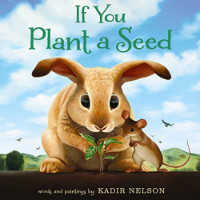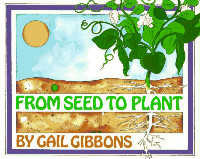Literary
If You Plant a Seed
 Bunny and Mouse have found a seed they want to plant and learn about friendship along the way! Full of beautiful images, readers will follow along with the story through pictures more so than words. A great book full of friendship, planting seeds, and how those two things might just be connected.
Illustrator: Kadir Nelson
Publication year: 2015
Publisher: Balzer + Bray
ISBN: 978-0062298898
Number of pages: 32 Pages
NAAEE: Strand 2: Knowledge of Environmental Processes and Systems
Find At Your Library
Bunny and Mouse have found a seed they want to plant and learn about friendship along the way! Full of beautiful images, readers will follow along with the story through pictures more so than words. A great book full of friendship, planting seeds, and how those two things might just be connected.
Illustrator: Kadir Nelson
Publication year: 2015
Publisher: Balzer + Bray
ISBN: 978-0062298898
Number of pages: 32 Pages
NAAEE: Strand 2: Knowledge of Environmental Processes and Systems
Find At Your Library
Informational
From Seed to Plant
 With this book, young students will begin to learn how seeds grow into plants and how they pollinate. Filled with plenty of facts and information, this is a great book to get young learners started on understanding plants. At the end, there are plenty of facts about seeds and plants as well as a project idea to put your new information into practice.
Illustrator: N/A
Publication year: 1993
Publisher: Holiday House
ISBN: 978-0823410255
Number of pages: 32 Pages
NAAEE: Strand 2: Knowledge of Environmental Processes and Systems
Find At Your Library
With this book, young students will begin to learn how seeds grow into plants and how they pollinate. Filled with plenty of facts and information, this is a great book to get young learners started on understanding plants. At the end, there are plenty of facts about seeds and plants as well as a project idea to put your new information into practice.
Illustrator: N/A
Publication year: 1993
Publisher: Holiday House
ISBN: 978-0823410255
Number of pages: 32 Pages
NAAEE: Strand 2: Knowledge of Environmental Processes and Systems
Find At Your Library
Topic: Plants, Gardening, Bunny Rabbit, Mouse,
Age: Preschool
Active Learning Strategy: Flashcards
Type: Flashcards
Title: Plant Parts
Learning Objective: Using flashcards, students will be able to identify the different parts of a plant and the different stages of plant growth.
Description: In this activity, students will correctly identify different parts of the plant lifecycle and different parts of plants using flashcards. The students will read the book From Seed to Plant by Gail Gibbons and then review a series of flashcards to test them on what they learned. Once they have done this, students will have the chance to create their own flashcards so that they can continue to learn about plants after the lesson is over.
Materials: Copy of From Seed to Plant by Gail Gibbons, flashcards, paper, writing utensils
Preparation: Create the flashcards of the different parts of a plant and the different stages of plant growth. Examples HERE and HERE
Directions:
Notes about this strategy: This strategy was broken up into two parts, but if time is limited, you can always just have the students read and run through the flashcards or read and create their own. Either way, the intention is to test students' knowledge of what they read without using a test. |
